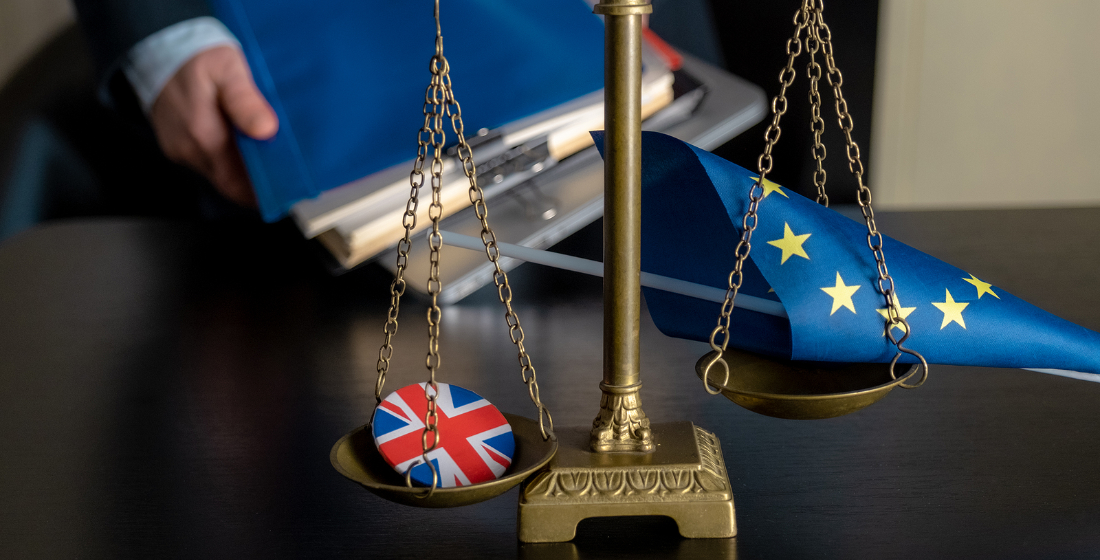UK-EU TCA: The Brexit divorce papers continued
The signing of the EU-UK Trade and Cooperation Agreement (TCA) marks the first major deal for the UK with a regional trade bloc since its withdrawal from the European Union. But both UK and EU exporters need to brush up on their new obligations under the latest Brexit divorce documents.

Brexit – the UK’s exit from the EU, a topic which has divided a nation – has dumped Britain into the single life outside the bloc during what could be its deepest recession for more than 300 years. Unwinding a marriage of half a century was never going to be easy. But the EU-UK Trade and Cooperation Agreement (TCA) is a start – albeit throwing up more ‘non-tariff barriers’ than it says on the divorce documents – as the UK government looks to cajole other major regional trade blocs into economic partnerships.
The British prime minister Boris Johnson promised a deal with Britain’s largest single trading partner which was free from quotas or tariffs, and the signing of the EU-UK TCA was his “early Christmas present” to Blighty. Although the agreement, which came into effect on 31 December 2020, teetered on the edge of collapse in the months leading up to Christmas Eve 2020 — the day the TCA was finally settled.
The ‘Canada-style’ trade deal with the EU was a political victory for Johnson despite the impending economic consequences – the UK’s Treasury assesses the deal will cut almost 5% from the UK economy over the longer term. And while the hefty 1,246-page document has fulfilled, in parts, his pledge – the UK is no longer in the single market or the customs union of the EU – it has also provided a myriad of red tape for British and EU businesses.
Rewriting decades of integration was always going to spark trials and tribulations: Brexit took four years and three UK prime ministers; a constitutional crisis in which the UK was reminded the only rule in its constitutional monarchy was that parliament is sovereign; nine formal rounds of negotiations; and a subsequent flurry of increasingly tense daily contacts towards the end of last year.
So when Johnson announced a last-minute Brexit deal, it came as a surprise to many. Some had even forgotten how they voted in the Brexit referendum of 2016. Sticking points of the deal, including British waters and fishing rights and rules of origin in the automotive sector/on batteries for electric vehicles, were ironed out in the final weeks of negotiations.
UK exporters have been given a one-year grace period to brush up on new obligations when doing business in Europe. However, failure to certify the rules of origin – like where components for manufactured products have come from – or adhere to documentation requirements, will result in exporters having to cough up customs duties.
Another ominous facet of the deal is that there is nothing in the TCA denoting rules around financial services, the engine of the British economy, a sector which accounts for the bulk of UK exports to the EU. Instead a MoU was issued stating that the EU and the UK would begin discussions around equivalence by the end of Q1 this year.
Consequently, financial firms that previously used financial services passports under EU single market directives, find this right is no longer available to them. Currently, this right is only likely to be restored in the event that the EU grants equivalence to UK firms to do business with customers in the region (from 1 January 2021, the UK will be considered a third country under EU law). And with the EU far from certain to grant that access, firms are beefing up their continental presence.
The cost of sovereignty
Last month Johnson did admit the TCA deal “does not go as far as we would like [for financial services]”. This is something of an understatement. But in reality, banks, insurers and funds were uprooting to Frankfurt long before the deal came along. For one, firms in Europe’s financial capital feared a potential ‘no deal’ scenario, which entailed crashing out the EU without a trade deal and operating under WTO rules.
According to EY, in October 2020, two months prior to the TCA signing, financial services firms operating in the UK shifted about 7,500 employees and more than £1.2 trillion pounds ($1.6 trillion) of assets to the EU. In the report by the consulting firm, which tracks 222 of the largest financial firms with significant operations in the UK, around 400 relocations were announced at the end of Q3 alone.
UK banks that conduct cross border business into the EU have been working on Brexit transformation programmes which are very complex, with a plethora of deliverables. These include restructuring local EU entities; designing new ways of operating and transacting; gaining appropriate local regulatory approvals; connecting with new market infrastructure providers (who may be undertaking their own transformation project), moving staff into new premises and drawing up new contracts with suppliers.
When restructuring local EU entities, UK banks have been mindful of communications from the European Central Bank and the European Banking Authority. Likewise, UK corporates, especially in the automotive sector, will want clarity on a range of areas like data flows and the timescale for setting up UK regulatory agencies to take over work from their EU counterparts. New UK regulatory agencies within the year would be great — but in Brexit years, time moves at a slow pace.
For data flows there is a temporary six-month agreement to keep the current rules in place until a new ‘adequacy decision’ is sorted. But any decision on data protection will be unilateral and not up for negotiation.
Brexit was always going to create additional costs for firms: think customs declarations, certification costs, audits to prove that rules of origin requirements are met, border delays disrupting just-in-time systems, EU customers switching to other suppliers, and visa costs for EU workers.
So, despite Johnson claiming that the deal ensures ‘no non-tariff barriers’, this is clearly not the case. In fact, non-tariff barriers will be quite substantial. Various estimates have put the cost of completing customs declarations alone at around £15 billion for the UK economy as a whole. And that’s before we get to complying with rules of origin.
Rules of origin: more paperwork
Rules of origin paperwork is now top on UK exporters’ list of things-to-do in a post-Brexit world, specifically manufacturers that import parts or ingredients from around the world to produce goods. And given trade finance is already synonymous with piles of loan documentation and overly complex export credit application procedures, exporters of all sizes need to get this right to avoid even more paperwork.
SME exporters will need to be particularly alert to the new changes where rules of origin apply and need to contact their supply chains, hauliers and clients sooner rather than later. But so do large firms. Heavy goods mean hefty duties payable to customs if the new TCA obligations are not met. Major UK EPCs and car manufacturers import parts from all over and will need to check guidance rules forensically, however these large firms have greater resources than SMEs to adhere to the new requirements.
For automakers based in the UK, the good news is that there is full bilateral cumulation, allowing UK and EU parts to count towards local content rules in enabling goods like cars to avoid tariffs. Although the UK’s ask for diagonal cumulation with third countries like Japan, China and Turkey was rejected by the EU, what’s been agreed will be enough for most carmakers in the UK to avoid tariffs unless they are importing lots of high value components from, for instance, Japan. This is unlike the UK-Japan free trade agreement signed in September last year, the UK’s first trade deal as an independent trading nation.
Interestingly, the UK government summary document refers to ‘modern and appropriate rules of origin’ – what this actually means is not clear at this point. What it may imply is more flexibility over how such rules are applied.
One element of flexibility appears to come with the self-certification of rules of origin (according to the EU summary document). Here it appears that automotive assemblers will need to collect and maintain information on the origins of components, but this appears to give assemblers some time to set up systems to collate this information. It is important to note, none of this data currently exists in either the UK or EU because it was not needed in the single market.
A brave new world
The UK is the first non-member EU country to seal a free trade agreement with the bloc with zero tariffs and zero quotas. And despite the hidden costs of the TCA, getting a trade deal for the UK, which allowed divergence from EU standards, was better than the alternative of crashing out of the union and operating under WTO trade terms.
Brexit with a deal was never going to be made easy by the EU, as the bloc looked to keep its remaining 27 countries intact amid a rise in nationalism in Europe (and the rest of the world). But let’s be clear, there are measures in the TCA for the possible imposition of tariffs if the UK strays too far from existing standards.
Johnson said it was “unlikely” the UK would impose its own tariffs, but he added that any imposed by the EU “would have to be proportionate and approved by the arbitrator”, and if that happened regularly, the UK would revert to WTO trading terms. In short, an EU-UK trade war is still on the cards.
He also believes the UK could and would set its own path in some areas, mentioning the notion of so-called free ports, low-tax trade zones which advocates say boost economic growth (and critics accuse of potentially blurring the lines between tax avoidance and evasion). Free ports already exist within the EU, although with some restrictions.
And in another glimpse of Britain’s potential on the global stage, Johnson decided to mark the first anniversary of Britain leaving the EU by formally applying to join a trade group in the Pacific – the Comprehensive and Progressive Agreement for Trans-Pacific Partnership (CPTPP). The CPTPP includes fast-growing economies including Mexico, Malaysia and Vietnam along with established regional players such as Japan, Australia, New Zealand and Canada.
Johnson hopes US president Joe Biden will also join the CPTPP, opening a backdoor to closer UK-US trade ties as hopes of an early trade deal between London and Washington fade. But Johnson will need to muster more than hope if the UK is going to forge long-lasting ties with other regional trade blocs, starting with the Trans-Pacific trade group, which is not exactly next door to the UK.
Johnson held out on the EU over the Brexit deal, and consequently got more out of the TCA from the bloc. The majority of economists claim a Brexit trade deal is better than a ‘no deal’ scenario – but they also agree the UK is worse off than if it had voted to stay in the EU.
The long-term outlook of Brexit holds promise for a new role in global trade though, and the UK’s ECA UKEF is going to play a vital role as Britain looks to forge new economic relationships. Direct lending tied to exports gives UKEF formidable financial firepower to plug UK exports, but the ECA’s coffers will need more budget from Johnson if it is to compete on the global stage in a post-Brexit/Covid world. The US government recently upped US Exim’s direct lending capacity by 20%, in comparison.
The UK also has a responsibility to trade with partners that respect human rights and the best practices of UK businesses, with the former causing a Tory rebellion over Johnson’s post-Brexit trade bill last week, in legislation that would allow the UK government to forge new agreements with other countries outside the EU.
Ministers for the bill insisted decisions on trade deals and international relations should not be matters for the courts, while those protesting against the law want to ban trade deals with countries which are guilty of genocide. Perhaps people will come before profit as the UK polishes the legalities of entering a brave new world, with even graver responsibilities. One can only hope.
Become a TXF subscriber for unrestricted access to TXFnews.com 365 days a year
Contact us for individual and team rates by emailing subscriptions@txfmedia.com
Take a look below at a selection of exclusive subscriber articles published last week
Hydrogen: A matter of scale
Green hydrogen projects are on the increase – but they are also in the earliest stages of development and consequently banks are still treating the sector with caution. Will this emergent sector come into its own in the next decade? And what will it take to change lender angst to appetite?
Commodities supercycle or surge?
Commodity prices reaching bullish levels as the world prepares to move out of the Covid crisis and into a green industrial revolution has sparked some excitement around the possibility of the next supercycle. But with bank funding growing increasingly sparse, there is a mismatch between demand and supply of capital - a sure problem for traders if the supercycle is here to stay.
MET Group dodges 'Covid premium' on annual RCF
Swiss-based energy company MET Group has secured its annual revolving credit facility (RCF) at €915 million. The deal comprises two tranches: a €592.5 million ($715 million) secured facility and a €322.5 million unsecured piece.
Xiamen Xiangyu steel plant closes ECA-covered loan
Obsidian Stainless Steel – a joint venture between China’s state-owned Xiamen Xiangyu (51%) and Jiangsu Delong Nickel Industry (49%) – reached financial close on a Rmb6.88 billion ($1.06 billion) debt package to finance the Xiamen Xiangyu integrated steel plant in Indonesia.
Mainstream out to banks for Copihue wind project debt
Mainstream Renewable Power started sounding out banks last month for an approximately $160 million loan to fund its 100MMW Copihue wind farm in Chile. Mandates are due imminently, with financial close targeted for April.
Adaro Energy out to banks for refi
Indonesian coal mining company Adaro Energy is out to banks for $400 million to refinance its outstanding debt from a $1 billion 2014 facility.
Brazil’s Vale reaches $7 billion settlement over mine dam collapse
Brazilian mining company Vale SA has reached a R37.6 billion ($7 billion) settlement this week with the government of Minas Gerais state in Brazil in relation to the disaster of the mine dam which collapsed in January 2019 killing 270 people and causing vast environmental damage to the regional environment. A further 11 people are still missing.





